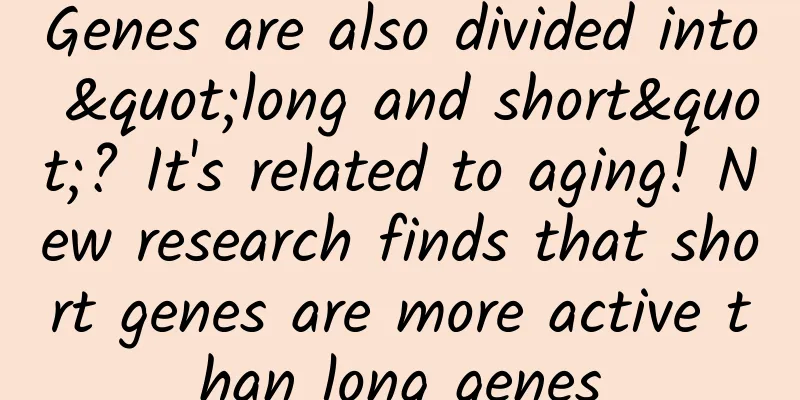Genes are also divided into "long and short"? It's related to aging! New research finds that short genes are more active than long genes

|
Author: Duan Yuechu Aging is an inevitable part of human life, but recent studies have shown that gene activity may be closely related to aging. Genes are the genetic material that controls and regulates life processes in organisms, and gene activity determines its expression level and function in cells. The Aging Process and Cellular Senescence Aging is a complex biological process that involves the interaction of many factors. Cellular senescence is one of the important aspects of the aging process, which involves changes in multiple molecules and signaling pathways within cells. Over time, the function and stability of cells gradually decline, leading to the gradual aging of the body. Short genes lead to more active life cycle A recent study found that short genes are more active than long genes and are closely associated with aging. This discovery overturns the traditional idea that gene length is related to function. The researchers found that short genes are expressed in cells for a shorter time but with higher intensity, which may help cells perform their functions more efficiently and delay the aging process. The more active life cycle of short genes may be attributed to their special structure and function. Compared with long genes, short genes usually contain fewer coding regions, so there is a lower probability of errors during transcription and translation. This means that the proteins encoded by short genes are less susceptible to DNA mutations and are more likely to maintain the normal function of cells. In addition, short genes are less volatile during DNA replication and repair, reducing errors and problems during cell replication and repair. This makes short genes less likely to mutate than long genes, maintaining cell stability and normal function, thereby slowing down the aging process. In summary, short genes are more likely to maintain higher gene activity than long genes. The study found that short genes are closely related to cell aging and the overall aging process. This discovery provides a new perspective for our understanding of the aging mechanism and is expected to provide new therapeutic strategies for delaying aging and improving health and longevity in the future. The association between long genes and cell aging In addition to short genes, researchers have also found that long genes are associated with cell aging. Long genes usually contain more coding regions, so there is a higher probability of errors and problems during transcription and translation. These errors and problems may lead to abnormal protein structure and function, thus affecting the normal function of cells. In addition, the DNA replication and repair process of long genes is relatively complex and highly variable. Over time, errors and problems during the replication and repair of long genes will accumulate, causing cells to be in an unstable state and accelerating the process of cell aging. Molecular mechanisms of aging and gene activity The molecular mechanisms linking aging to gene activity are a complex area that still requires further research to fully understand. However, some studies have revealed some possible mechanisms. One possible mechanism is gene methylation. Methylation is an important process for regulating gene expression, which regulates gene activity by adding and removing methyl groups. Studies have shown that the methylation state of genes changes during aging, causing the activity of some genes to decrease, thereby accelerating the process of cell aging. Another possible mechanism is the regulation of non-coding RNA. Non-coding RNA is a class of RNA molecules that do not have protein coding ability. They can regulate gene expression and function by interacting with other genes or proteins. Studies have found that the expression pattern of non-coding RNA changes during aging, which may affect the normal function and stability of cells. Research prospects for gene activity and health extension The study of aging and health extension has always been one of the focuses of scientists. By deeply studying the relationship between gene activity and aging, we are expected to find new therapeutic strategies to delay aging and improve health extension. Researchers have begun to explore the possibility of delaying aging by using gene editing and gene regulation technologies to adjust the activity of genes. For example, by increasing the expression of short genes or reducing the expression of long genes, it is possible to change the function and stability of cells and thus delay the aging process. In addition, some studies have found that through interventions such as diet, exercise and drugs, gene expression and activity can be regulated, thereby delaying the aging process, which has opened up new avenues for the study of healthy longevity. Although the relationship between gene activity and healthy longevity is not yet fully understood, as research continues to deepen, we have reason to believe that research on gene activity will provide us with new breakthroughs and provide stronger support for the goal of delaying aging and improving healthy longevity. References: https://www.scientificamerican.com/article/aging-is-linked-to-more-activity-in-short-genes-than-in-long-genes/ |
>>: Ammonia treatment administrator: Why can this battery save fish lives?
Recommend
Things change in China: The Ice Bucket Challenge is drifting away from charity
An "Ice Bucket Challenge" aimed at rais...
CINNO: China's investment in new energy industry will exceed 5 trillion yuan in 2022, a year-on-year increase of more than 240%
According to data from CINNO Research's "...
What are the daily work contents of SEO and what are the tasks of SEO?
Before I knew it, I have been working in SEO for ...
Why does "couple cancer" occur? The "killer" behind it is ignored by many people
Today, the topic is "A couple both got cance...
Microsoft: 49% of respondents in the 2023 Job Trends Index report are worried about being "taken away" by AI
Microsoft recently launched its 2023 annual Work ...
Nokia: You thought it was dead, but it has quietly returned to second place in the world
Nokia was once the king. It once had: the best ind...
Why do the groups you created eventually become dead groups?
If you create a community just for the sake of cr...
Tencent social advertising, tips for collecting customer consultation in the wedding photography industry
Wedding photography is a key industry for Tencent...
Alibaba's Hu Xiaoming: All cars without intelligent Internet of Things will become antiques. AliOS is accelerating the popularization of automotive systems
At the AliOS Summit of the Yunqi Conference, Alib...
Zhao Dongxuan: New strategies for acquiring customers in 6 major industries (65 lessons)
Zhao Dongxuan: New Strategies for Customer Acquisi...
Google open sources Swift for TensorFlow: Can we finally put Python aside?
At the TensorFlow Developer Summit in March this ...
3 ways to increase user traffic!
User growth has always been a key to business ope...
How do offline stores build a user growth system?
With the development of the Internet, people are ...
Aircraft piston engine
Aviation piston engines rely on the reciprocating...
Following Huawei and Xiaomi, Meizu also started developing mid-to-high-end mobile phone chips with investment from Alibaba.
Meizu's new flagship PRO 6 Plus uses Samsung&...









